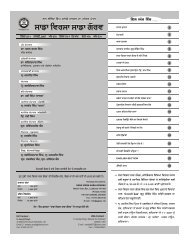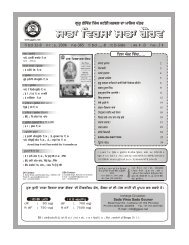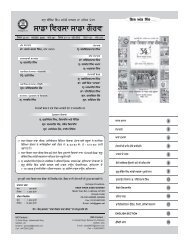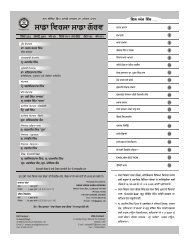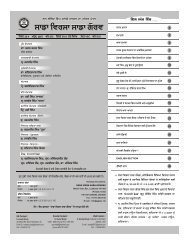PAGE WISE MAY 2007 - Guru Gobind Singh Study Circle
PAGE WISE MAY 2007 - Guru Gobind Singh Study Circle
PAGE WISE MAY 2007 - Guru Gobind Singh Study Circle
Create successful ePaper yourself
Turn your PDF publications into a flip-book with our unique Google optimized e-Paper software.
commit an act of apostasy or to five up riding a<br />
motor-bike. Punishment for disobeying military<br />
command during the war was death, but the Sikhs<br />
did not care for it. They refused and revolted<br />
against the order. They refused to fight if they<br />
were compelled to do so. The military command<br />
and the law of the steel-helmet was at once<br />
changed, giving exemption to the Sikhs. The<br />
sanctity of the turban and their solemn vow that<br />
they would, under no circumstances, wear<br />
helmets meant more to them. The Divine law<br />
clashed with the secular law, and the Sikhs stood<br />
firmly by the Divine Law.<br />
“We have very old documents of the Sikh<br />
Code of Conduct in the British Museum,<br />
particularly No. 14152 bb 2. It is entitled<br />
Rehitnama Prahlad Rai and Bhai Nand Lal. The<br />
first and foremost injunctions are : Cursed is a<br />
Sikh (i) who visits prostitutes, (ii) gambles, (iii)<br />
who smokes, (iv) who goes out in the society<br />
without a turban or wears a cap instead of turban,<br />
(v) who cuts or trims his beard and hair, (vi) who<br />
eats meat, cut according to Muslim rites. Those<br />
who contravene or transgress any of these<br />
commandments are treated as apostate Sikhs. Any<br />
backsliding is an act of heresy. They must seek<br />
baptism again if they wish to become morally and<br />
spiritually accepted Sikhs.<br />
“My Lord, it was Edmund Burke, who said<br />
that there are two and only two foundations of<br />
law : utility and equity or justice. The law<br />
compelling everyone to wear crash-helmets was<br />
made with an eye on utility. I have seen with my<br />
own eyes a number of people, wearing crashhelmets,<br />
dying in motor accidents. Other parts of<br />
the body are as vulnerable and sensitive to injury<br />
as the head. But as far as the Sikhs are concerned,<br />
the second foundation of law, that of equity and<br />
justice, has been completely ignored.<br />
“Human laws, no doubt, are made out of the<br />
instinct of self preservation and are subject to<br />
change where they infringe anyone's personal,<br />
religious and cultural freedom. The Divine Laws<br />
or religious laws grow out of the spiritual will of<br />
man to conquer fear and death, to overcome<br />
suffering and transience, and live in inner peace<br />
and glory of eternity. The turban is worn by the<br />
May <strong>2007</strong><br />
Sikhs under a divine command of the Founders of<br />
Sikhism, aiming to give them inspiration for<br />
achieving such a state of mind and spirit.<br />
“No Indian or British law can compel or<br />
coerce the Sikhs to change this Divine Law of our<br />
prophets, or modify it under any circumstances.<br />
The turban is a part of this moral and spiritual<br />
discipline and way of life, whose sole purpose is to<br />
conquer fear and death. Nothing else, least of all a<br />
crashhelmet, nay not even a steel shirt, a steel pant<br />
and a steel coat can give that sense of moral and<br />
spiritual power and security, which the turban<br />
and the Sikh Code of Conduct, associated with the<br />
turban, gives it. A Sikh who wears a helmet in any<br />
form, abjures his faith morally and spiritually,<br />
though he may continue to call himself a Sikh by<br />
reason of his birth in a Sikh family. This law<br />
compelling the Sikhs to wear crash-helmets is<br />
unreasonable, infringement of the religious<br />
freedom of the Sikhs in U.K., the majority of whom<br />
are now the citizens of this country, which<br />
believes and even loudly preaches democratic<br />
freedom and equality for all minorities.<br />
“Laws, said Plutarch, are like spider's web.<br />
They hold the weak who are caught in their<br />
meshes, but the rich and the powerful escape it.”<br />
This law compelling everyone driving a motorbike<br />
to wear crash-helmet is ornamental to all<br />
Christians, but to the Sikhs it has proved to be a<br />
spider's web. As weak and helpless victims of this<br />
spider's web, the Sikh religious minority in this<br />
country has come to this court for justice. Injustice<br />
in this case has arisen out of a too literal and<br />
absolutely secular constructions of the law.<br />
The Sikhs have only two alternatives in the<br />
face of such a law. They should either abjure their<br />
faith in order to obey it, or they must break this<br />
law till it is suitably changed or declared bad in<br />
law by the courts. No self-respecting people can<br />
accept the first alternative. It would amount to<br />
signing the death warrant of their own faith and<br />
culture.<br />
“My Lord, the Sikhs who are accused of<br />
driving the motorbike without wearing the<br />
helmet, are not breaking the law wilfully. They are<br />
on the other hand merely seeking justice and<br />
resisting any conscious or unconscious attempt on<br />
cwry kuMfw FUFIAw ko nIm@I mYfw ] jy quDu BwvY swihbw qU mY hau qYfw ]<br />
36


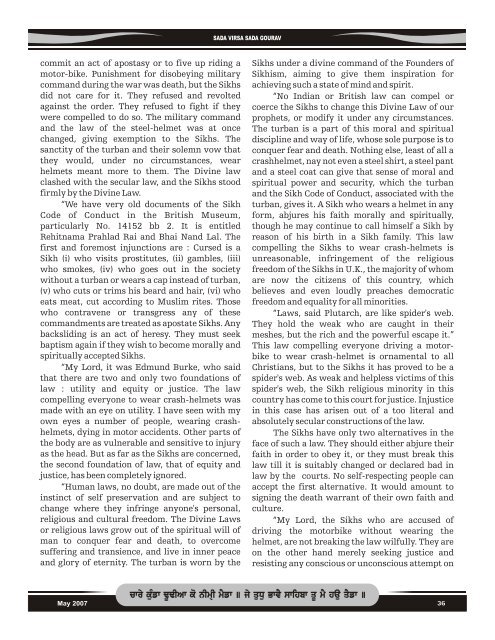
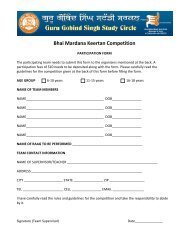
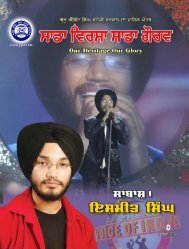
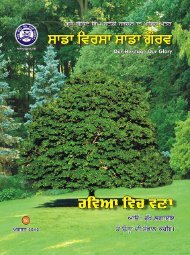
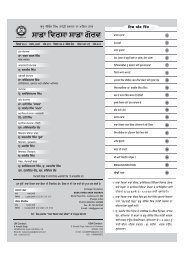
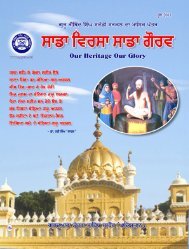

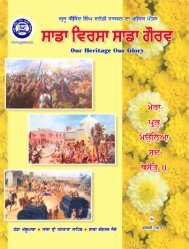
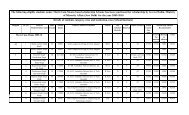
![ikau ibsrY pRBu mnY qy ijs ky gux eyh]](https://img.yumpu.com/43104272/1/190x245/ikau-ibsry-prbu-mny-qy-ijs-ky-gux-eyh.jpg?quality=85)
